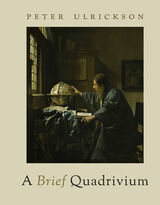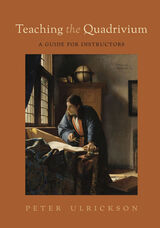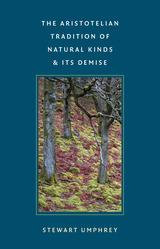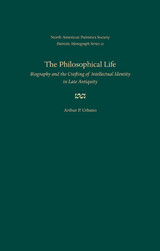1061 scholarly books by Catholic University of America Press and 4
have author last names that start with U
1061 scholarly books by Catholic University of America Press and 4
1061 scholarly books by Catholic University of America Press
4 have author last names that start with U have author last names that start with U
4 have author last names that start with U have author last names that start with U

A Brief Quadrivium
Peter Ulrickson
Catholic University of America Press, 2023
Mathematics holds a central place in the traditional liberal arts. The four mathematical disciplines of the quadrivium-arithmetic, geometry, music, and astronomy-reveal their enduring significance in this work, which offers the first unified, textbook treatment of these four subjects. Drawing on fundamental sources including Euclid, Boethius, and Ptolemy, this presentation respects the proper character of each discipline while revealing the relations among these liberal arts, as well as their connections to later mathematical and scientific developments.
This book makes the quadrivium newly accessible in a number of ways. First, the careful choice of material from ancient sources means that students receive a faithful, integral impression of the classical quadrivium without being burdened or confused by an unwieldy mass of scattered results. Second, the terminology and symbols that are used convey the real insights of older mathematical approaches without introducing needless archaism. Finally, and perhaps most importantly, the book is filled with hundreds of exercises. Mathematics must be learned actively, and the exercises structured to complement the text, and proportioned to the powers of a learner to offer a clear path by which students make quadrivial knowledge their own.
Many readers can profit from this introduction to the quadrivium. Students in high school will acquire a sense of the nature of mathematical proof and become confident in using mathematical language. College students can discover that mathematics is more than procedure, while also gaining insight into an intellectual current that influenced authors they are already reading: authors such as Plato, Aristotle, Augustine, Thomas Aquinas, and Dante. All will find a practical way to grasp a body of knowledge that, if long neglected, is never out of date.
[more]

Teaching the Quadrivium
A Guide for Instructors
Peter Ulrickson
Catholic University of America Press, 2023
Reviving an educational tradition involves a double task. A new generation of students must be taught, and at the same time the teachers themselves must learn. This book addresses the teachers who seek to hand on the quadrivium-the four mathematical liberal arts of arithmetic, geometry, music, and astronomy-at the same time as they acquire it.
Two components run in parallel throughout the book. The first component is practical. Weekly overviews and daily lesson plans explain how to complete the study of A Brief Quadrivium in the course of a single school year, and suggestions for weekly assessments make it easy to plan tests and monitor student progress. The second component is directed to the continuing education of the teacher. Short essays explore the history, philosophy, and practice of mathematics. The themes of these essays are coordinated with the simultaneous mathematical work being done by students, allowing the teacher to instruct more reflectively.
Some users of this book are confident in their grasp of mathematics and natural science. For them, the essays will clarify the unity of mathematical activity over time and reveal the old roots of new developments. Other users of this book, including some parents who school their children at home, find mathematics intimidating. The clear structure of the lesson plans, and the support of the companion essays, give them the confidence to lead students through a demanding but doable course of study.
The British mathematician John Edensor Littlewood remarked that one finds in the ancient mathematicians not “clever schoolboys” but rather “Fellows of another College.” This guide invites all teachers of the quadrivium to join the enduring mathematical culture of Littlewood and his predecessors, and to witness for themselves the significance and vitality of a tradition as old as Pythagoras.
[more]

The Aristotelian Tradition of Natural Kinds and Its Demise
Stewart Umphrey
Catholic University of America Press, 2018
There are two great traditions of natural-kinds realism: the modern, instituted by Mill and elaborated by Venn, Peirce, Kripke, Putnam, Boyd, and others; and the ancient, instituted by Aristotle, elaborated by the “medieval” Aristotelians, and eventually overthrown by Galilean and Newtonian physicists, by Locke, Leibniz, and Kant, and by Darwin. Whereas the former tradition has lately received the close attention it deserves, the latter has not. The Aristotelian Tradition of Natural Kinds and its Demise is meant to fill this gap. The volume’s theme is the emergence of Aristotle’s account of species, what Schoolmen such as Thomas Aquinas and William of Ockham did with this account, and the tacit if not explicit rejection of all such accounts in modern scientific theory. By tracing this history Stewart Umphrey shows that there have been not one but two relevant “scientific revolutions” or “paradigm shifts” in the history of natural philosophy. The first, brought about by Aristotle, may be viewed as a renewal of Presocratic natural philosophy in the light of Socrates’s “second sailing” and his insistence that we attend to what is first for us. It features an eido-centric conception of living organisms and other enduring things, and strongly resists any reduction of physics to mathematics. The second revolution, brought about by seventeenth-century physics, features a nomo-centric view according to which what is fundamental in nature are not enduring individuals and their kinds, as we commonly suppose, but rather certain mathematizable relations among varying physical quantities. Umphrey examines and compares these two very different ways of understanding the natural order.
[more]

The Philosophical Life
Arthur P. Urbano
Catholic University of America Press, 2013
Ancient biographies were more than accounts of the deeds of past heroes and guides for moral living. They were also arenas for debating pressing philosophical questions and establishing intellectual credentials, as Arthur P. Urbano argues in this study of biographies composed in Late Antiquity
[more]
READERS
Browse our collection.
PUBLISHERS
See BiblioVault's publisher services.
STUDENT SERVICES
Files for college accessibility offices.
UChicago Accessibility Resources
home | accessibility | search | about | contact us
BiblioVault ® 2001 - 2024
The University of Chicago Press









